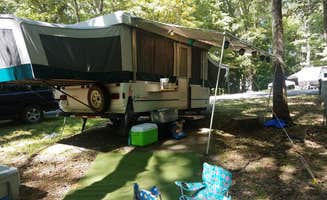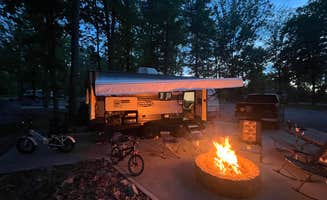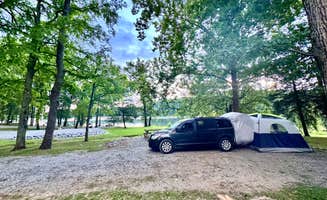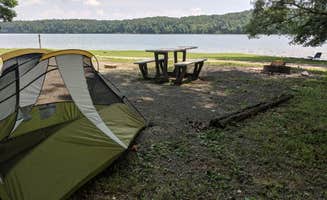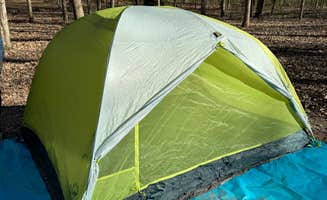Camping near Cerulean, Kentucky offers easy access to both Kentucky Lake and Lake Barkley, with most established sites located within a 30-mile radius of town. The region sits at approximately 480 feet above sea level, creating a mix of gently rolling terrain with some steeper lakeside areas. Winter camping options remain limited, with temperatures typically ranging from 25-45°F between December and February, when many facilities reduce services or close completely.
What to do
Fishing access points: 24/7 availability at several locations around Lake Barkley State Resort Park. "The campground has its own a boat ramp and no day use allowed," notes a camper at Lake Barkley, making it ideal for dedicated anglers looking to avoid crowds.
Nature observation: Bald eagle spotting is common at Energy Lake Campground. One visitor described the area as a "peaceful setting on the lake home to many bald eagle," making this location particularly attractive for wildlife photographers.
Kayaking no-wake areas: The smaller Energy Lake offers protection from larger watercraft. "The lake was gorgeous and perfect for kayaking though, with lots of nice coves to explore and wildlife to see. I saw a doe with a spotted fawn nursing on my first trip onto the water," reported one paddler staying at Energy Lake.
What campers like
Waterfront proximity: Many sites at Hurricane Creek provide direct lake access. "Our family has been camping here for 20 years now. We love it! Tent sites are right next to the beach so kids can go back and forth easily," notes a long-time visitor, highlighting the convenience for families.
Campsite privacy: Despite being close to water, many campsites maintain separation. At Hurricane Creek, "The sites are well spaced so you have privacy. All are first come first serve, so the early camper gets the best spots," explains a regular camper.
Non-motorized water activities: Several smaller lakes offer peaceful conditions. "There is a swimming area, and there are several areas to launch NONMOTORIZED watercraft. There are restrictions on this lake due to the wildlife refuge and preserve in the back of the lake - no motorized watercraft of any sort," explains a visitor to Energy Lake Campground.
What you should know
Site leveling challenges: Many campgrounds require extra equipment. At Lake Barkley State Resort Park, "Bring quite a bit of leveling materials as the sites are very unlevel. 1 dump station and an older but usable bath house," advises a recent camper.
Utility positioning: Electric hookups may require planning. "Well kept, no sewer hookup on sites, bath house clean, electric far from pads - bring extension cord," notes a Lake Barkley visitor, highlighting the need for longer cords.
Limited shower facilities: Some campgrounds have minimal amenities. At Taylor Bay Campground, "There are no amenities except a vault toilet and a boat ramp. The roads leading back to Taylor Bay are all paved, and each site has a fire ring, and is usually compacted gravel."
Cell service variability: Coverage depends on specific location. "I have AT&T cell service and could pick up three bars on an android," reports one camper at Taylor Bay, though service quality varies throughout the region.
Tips for camping with families
Beach access considerations: Not all swimming areas are equal. At Pennyrile Forest State Resort Park, "The beach is free to public so very crowded and some elements are not family friendly," warns one camper, suggesting weekday visits for quieter swimming.
Playground options: Some facilities are minimal. "The playground is old with just a metal slide and swings," notes a visitor to Energy Lake Campground, recommending bringing additional entertainment for children.
Multi-day activity planning: The region offers diverse activities beyond camping. "Checked out the Elk and Bison Prairie, which was really cool. Nature station was really cool and we rented some canoes to explore around that area. Went to the Homeplace, which is a working farm and 'living history museum,' which the kids really loved."
Tips from RVers
Site selection strategy: Choose carefully for larger rigs. At Hillman Ferry Campground, "Some sites are hard to back in with a camper, we had to buy longer extension cables and a longer water hose, sites are very close together," advises an experienced RVer.
Dump station timing: Plan around peak checkout times. "Only one dump site, and it's a one-sided, one port, pull-through lane, so if you go at checkout/1-2pm, expect a 2-3 RV wait to dump," warns a Hurricane Creek visitor.
Waterfront RV alternatives: Consider non-lakefront sites for better shade. "Many sites had drop offs on the door side of the pad so you could not use all the awning space," notes one RVer, suggesting interior sites might offer more usable outdoor space despite lacking water views.



